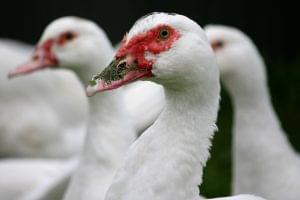Bird flu has reared its head again in Bács-Kiskun county
The laboratory of the National Food Chain Safety Office (Nébih) confirmed the presence of a highly pathogenic avian influenza virus in the animals of two duck farms in Bács-Kiskun county. The liquidation of the affected herds and contact farms has already taken place. Due to the repeated appearance of the epidemic, new measures apply to the technological movement of poultry. In addition, it is again mandatory to keep poultry indoors in commercial farms in high-risk counties.

(Photo: Pixabay)
In the herd of about 450 mallard geese located in the Bugac settlement in Bács-Kiskun county, the increase in mortality and nervous system symptoms drew the attention of the livestock keeper to the possible appearance of bird flu. The suspicion of bird flu also arose due to the increased mortality in the 800 mallard geese located in Kiskunmajsa. In both cases, the Nébih laboratory confirmed the presence of the H5N1 subtype of the virus. The animal health specialists already liquidated the affected herds based on suspicion, and also liquidated the contact farms in order to prevent the further spread of the epidemic. Specialists have designated a 3 km radius protection zone around the infected farms, as well as a surveillance zone, the latter of which also extends into the territory of Csongrád-Csanád County.
As a new measure in the areas of Bács-Kiskun and Csongrád-Csanád counties not affected by restrictions:
• The introduction and movement of waterfowl is prohibited. The only exception to this is transport for immediate slaughter, in which case it is mandatory to send 20 cloaca and 20 trachea/pharynx swabs to Nébih’s diagnostic laboratory within 72 hours before the animal is moved.
• 20 cloaca and 20 trachea/pharynx swabs must also be sent to Nébih within 72 hours before the transport of non-waterfowl poultry to slaughterhouses and further storage.
In each case, it is the responsibility of the service veterinarian involved in the transport to ensure that the transport can only be carried out with favorable laboratory test results.
In addition to the above, a mandatory tampon test prior to the technological movement of waterfowl is in force throughout the country, but from now on the condition of transport in this case too is the availability of a favorable result. In the high-risk counties, i.e. Bács-Kiskun, Békés, Csongrád-Csanád, Győr-Moson-Sopron, Hajdú-Bihar, Komárom-Esztergom and Szabolcs-Szatmár-Bereg counties, farms that keep poultry for commercial purposes are now again required to keep poultry indoors . In these counties, the new regulation applicable to “backyard” herds is feeding and watering in a covered place and, although not mandatory, it is strongly recommended to keep them indoors.
You can find information about outbreaks and current information on international trade on the Nébih bird flu webpage: https://portal.nebih.gov.hu/madarinfluenza
Nébih
Related news
The presence of bird flu has also been confirmed in Bács-Kiskun County
🎧 Hallgasd a cikket: Lejátszás Szünet Folytatás Leállítás Nyelv: Auto…
Read more >







